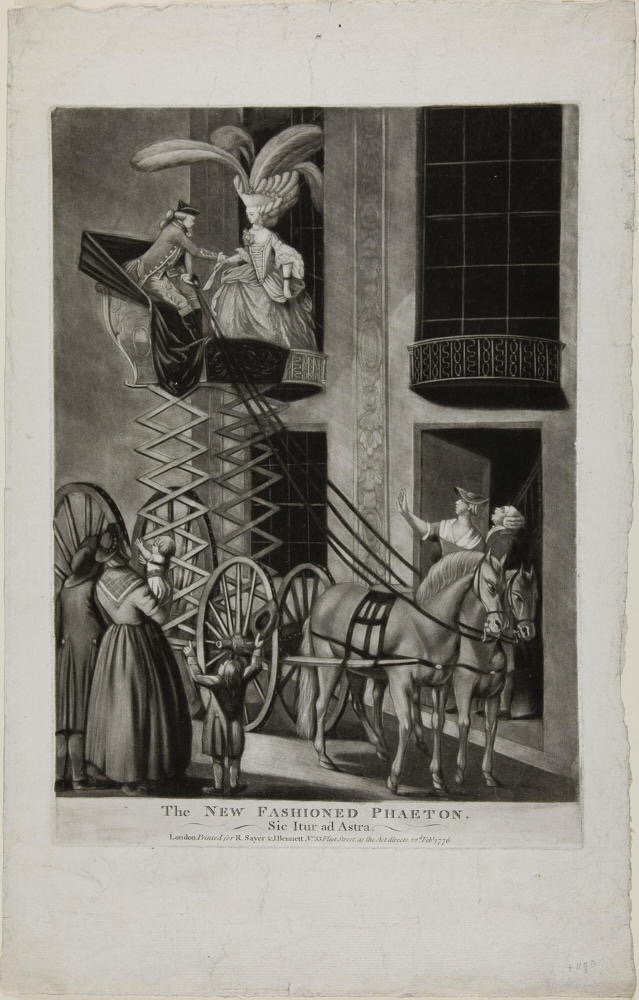Newness

Attributed to Philip Dawe: The New Fashioned Phaeton (1776)
ABOUT THIS ARTWORK
Devoting less effort to the fabric textures and pearly luster of high-society mezzotint portraits, publishers also mocked sartorial excesses, especially those with foreign sources. In 1770s London, the epithet macaroni was directed at dandyish men and overdressed women who adopted an outrageous, European style and acted in an affected manners that their genders were said to become indistinguishable. Such costumes evidently even made leaving home difficult. This print’s subtitle, “Sic Itur ad Astra” (which translates as “Thus one goes to the stars”) comes from the Roman poet Virgil and suggests that the wigs and expanding carriages shown here have reached astronomical new heights.
—Art Institute of Chicago
"There was never a prescience half as satisfying as projection."
Newness is getting old. As I have aged, the new has increasingly lost its attraction. The information age might have finally done it in, what with the daily builds and too-frequent upgrades. I can't hardly start my laptop without some update needing to be installed, and the old, once-reliable app suddenly behaves differently, never to regain its former utility. We seem too anxious to abandon what was in favor of what never quite is yet. We speak of evolution but experience near-constant revolution. What might I depend upon now?
I struggle even to imagine replacements when an old and once-reliable falls by some wayside. Yesterday, working with a blacksmith to install our front porch stair railing, I brought a container of Johnson's Wax® to use to help ease bolt anchors into place. He seemed surprised when he saw that familiar container, then reported that Johnson had stopped producing wax. I felt flabbergasted! Johnson no longer in the wax business? He went on to report that a can of that wax would sell for nearly a hundred and thirty dollars today. I asked him if he didn't use it when fabricating steel, and he replied that he had been using it and was struggling to find an adequate replacement. He went on to explain in too much detail the shortcomings of every alternative. I wondered how many other activities would be undermined by Johnson's fatal decision. I fled to the internet, hoping to disconfirm this report, but found confirmation instead in the form of an announcement from a customer representative of the SE Johnson Company of Racine, WS. Yes, indeed, their iconic paste wax has gone the way of the Dodo Bird.
I have never adapted well. I maintain a circa 1969 map of my hometown in my head. I use it, too, because more modern ones confuse me. It features long-gone retailers, and it confuses The Muse, who arrived after that past had already died. Who knows what any future holds? It seems odd that we embrace so cavalierly whatever's next. We routinely discard reliable cows for handfuls of magic beans when the future emerges untested, unproven. It arrives as speculation that never resolves quite as anticipated. We trade in what's not even half worn out yet. My basement overfloweth with half-dead objects replaced before their time with something rarely quite as good. The new seems mediocre in comparison, lacking any appreciation of tradition. I sneak down there to fondle what was once so familiar, knowing that I dare not try to put whatever back into circulation. I ache only to go backward again. That would feel like real progress to me!
The familiar must disappear. The known needs, above all, to be forgotten. It seems unlikely that anybody performs consumer research anymore. They foist stuff on unsuspecting customers, instead, usually "for their own good." This never wasn't a phony justification, for it presumed to know better for another. Real innovators understand that their customers should be the last people they ask. Satisfied customers are too busy being satisfied to bother imagining different. No, the innovator must imagine others' future without asking, for asking could only confuse and muddy otherwise clearer waters. I never wanted to know what's next. I didn't want to grow up, either, and I would argue that I haven't. I hesitantly move, kicking, screaming, or whimpering into whatever will become my future. I didn't want to be anybody different when I grew up. I fought to preserve what I already knew. I never really wanted to learn anything, either.
The NextWorld always seems like a scam in anticipation. It seems dystopian by nature, but only because it always has seemed that way. I know that the American Myth insists that tomorrow will inevitably be better and that we are never better than when striving for better, but I've grown to mistrust the myth. This seems humbling, for how can I even consider myself American if I've lost faith in this fundamental myth? Myths are the part of a culture that's never true, only believed in, and often fervently. It might be that for any culture to be viable it must include some ration of fiction. Frequently, the founding myth becomes the one most enthusiastically embraced. We most easily appreciate superhuman forebears, ones who sure seem as though they were prescient. We rarely see that we're creating the superhumans we believe in. The future we ascribe to them was one they never once imagined when they were alive. It was our job as the future to ascribe part of our identity to them. There was never a prescience half as satisfying as projection.
©2025 by David A. Schmaltz - all rights reserved


